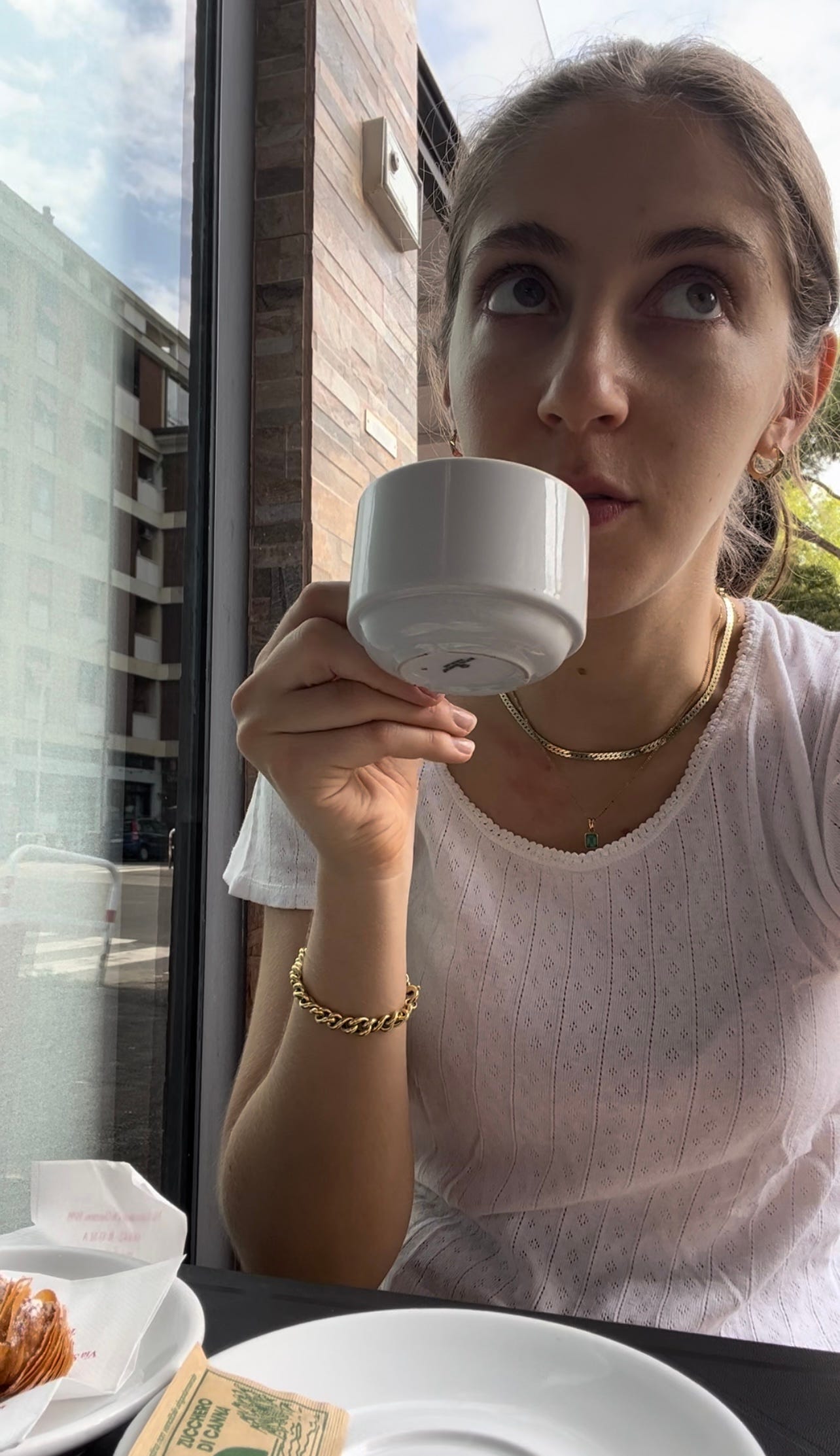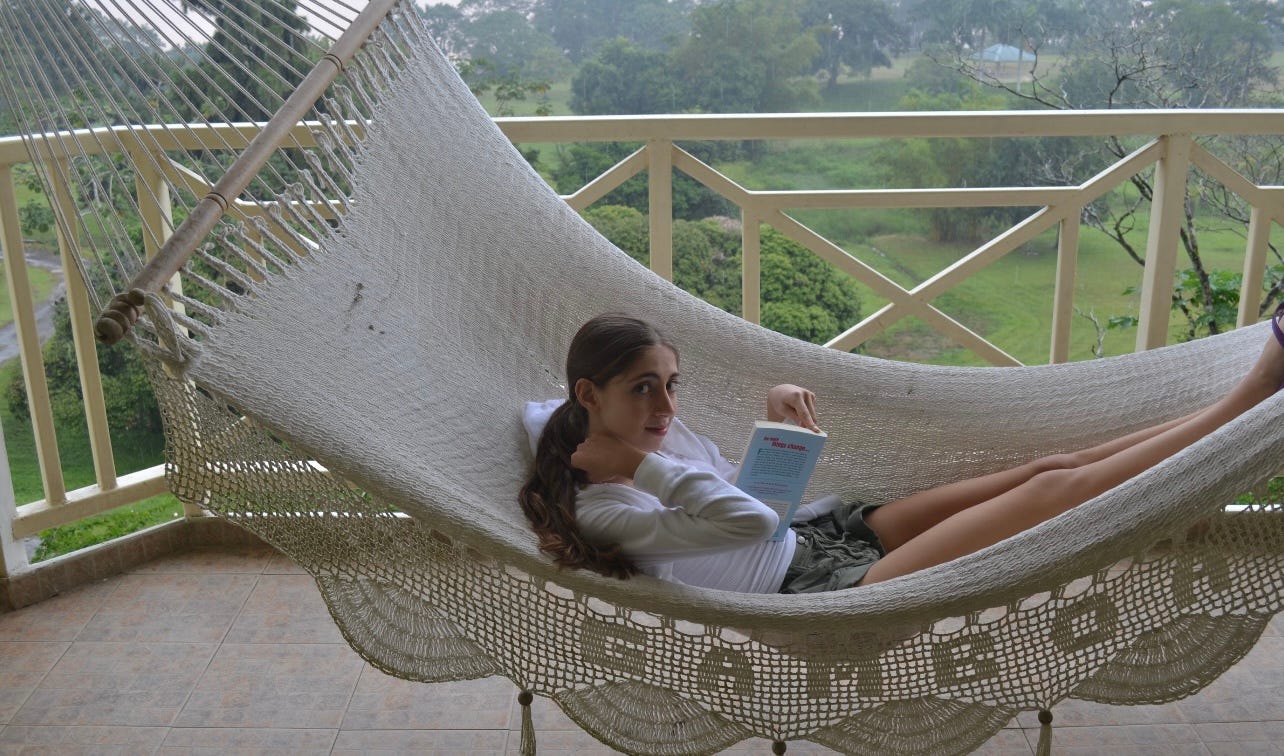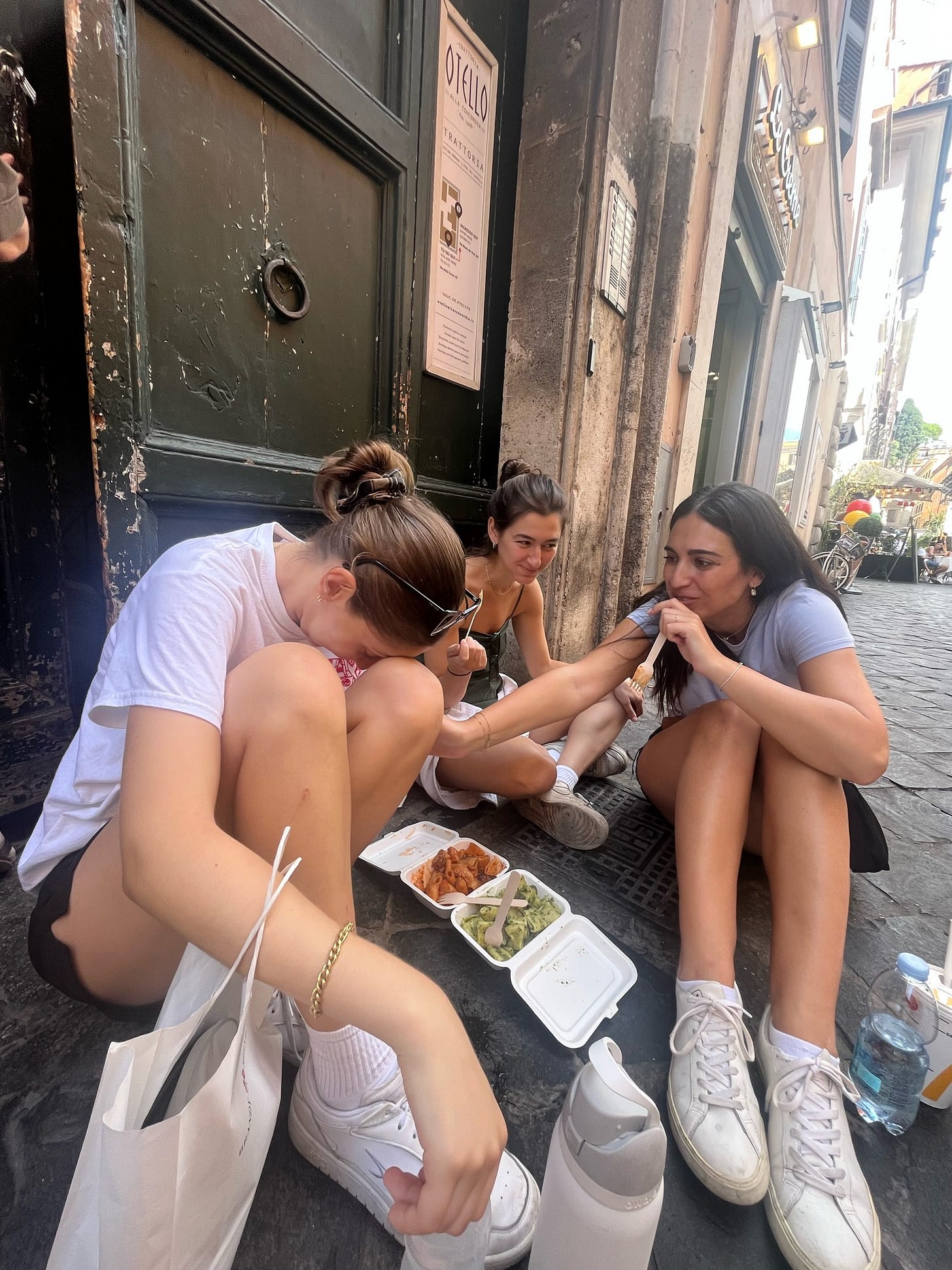9.29 | Permission to Change: Welcome to the rebrand!
My body's changed after two months of travel. I write about navigating that change — between meals of pasta and nightly gelato runs in Italy — with my history of disordered eating.
I lean on the counter, my elbows cooled by its granite surface. I’m cupping a white saucer of something I haven’t sipped in nearly five years.
Coffee. A cappuccino, to be exact. It’s nearly 9 a.m. here in Rome, and Italians begin each day with cappuccini aplenty.
When I started my humble Duolingo Italian practice at the beginning of this year, one of the first sentences I learned revolved around this morning ritual:
Un cappuccino, per favore.
I tapped through the exercise hurriedly, eager to get to the real Italian. After all, most people can understand the critical part of that sentence. “Cappuccino” is a term that every English-speaker will know; as I type it, even Microsoft Word doesn’t mark it with a zigzagged red line reserved for misspellings.
But caffè of all types is foreign to me. I cut out coffee years ago for several reasons, in descending order of importance: it made me jittery, disrupted my sleep, put a daily dent in my wallet, and upset my stomach (but as a Jewish gal with anxiety, my stomach is mad at me 90% of the time, so this last one wasn’t a deciding factor.)
I’m drinking coffee today, though, because all that pales in comparison to the cultural rite that is standing in a café in Rome as the city wakes up, ordering a cappuccino from a gruff nonno, and sipping it at the counter, scraping each last residual bit of foamy milk from the sides of the cup with a teeny metal spoon before starting the day.

After all, change is the only constant in my life lately. I’m living abroad, renting rooms for a few weeks here, a few days there; booking last-minute flights on budget airlines; traveling by train to capital cities and remote towns. I’m surrounded by more strangers than familiar faces most of the time. So I may as well try coffee again and see how it feels. (Editor’s note: I have now consumed at least one cappuccino, caffè or even espresso per day, and shows no signs of ending this new addiction habit. Typed with a slight tremor.)
Speaking of change, this Substack is getting a makeover. Over the last few weeks, I’ve strayed from the ethos of this newsletter. (But can you blame me? I swam with Harry Styles!) Permission Slips is a catalogue of my triumphs and pitfalls, a collection of the best and worst moments of my months of travel. But above all, I aim to provide inspiration, empowerment even, to those of us held back by our fears — to remind myself, and you, dear reader, that your signature is the only one you need to proceed on the field trip that is your life.
Moving forward, each of my posts will serve as a “permission slip” to do something new, scary or uncomfortable, based on something(s) I did — or am trying to do —that’s new, scary or uncomfortable. I hope this new format will provide a more organized, reader-friendly experience. This week, we’re talking about change.
Dear Reader: If you’ve struggled with disordered eating (especially if you haven’t quite healed from it) or if you’re struggling with your mental health generally right now, I encourage you to stop reading. Leave this post here and look forward to the next one. It’ll come soon.
For years, I woke up each morning in New York to a predictable routine. Exercise, sit at a desk, go to sleep. Repeat. But over the last two months, no two days have looked the same. I sleep in beds that aren’t mine, sit for hours on planes and trains, explore cities by foot, sample every local cuisine.
As a result, I don’t look exactly the same as I did before I left. At least, I don’t feel that I look the same. My hair feels thinner, I suspect from repeated washes in London’s hard water. Roman mosquitos feasted on my shins at dusk the other day, and I itched the bites into angry red scabs that show no sign of fading anytime soon. My legs rub together in an unfamiliar way when I walk: my quads are newly toned from thousands of daily steps on cobblestone streets, and my inner thighs feel a little softer, a little fleshier than before. My arms are squishy to the touch, lacking muscle tone that came from the weekly power yoga classes I attended in New York. My face even looks rounder, I observe as I brush my teeth before bed, taking in a slightly changed reflection in the mirror above the sink. This change is all to be expected, of course. My life is completely different! But I struggle to feel ok with it.
Time equals change. I’m awful at math, but this equation even makes sense to me. Landscapes erode. Wrinkles etch deeper onto faces. Scars fade. We’re not meant to stay the same! Time is a privilege, as are the physical signs of its passage. I’m so grateful to be traveling and living an unstructured life at the moment. But I hate the changes it’s inflicted on my physical self. What’s more, I hate admitting that I hate them.
I berate myself for berating myself over the deeply insignificant changes I’ve observed in my body — subtle physical markers of this adventure I’d urge anyone else in my shoes to wear with pride. I’m dumping all of this here in an attempt to give myself permission to physically change, and be at peace with it. That’s a lot easier said than done, for anyone. For me, it’s extra difficult: I have a history of disordered eating.
I was 14 years old when my mind and body succumbed to a powerful eating disorder, like Paris falling to German occupation during World War II. Anorexia Nervosa was my diagnosis. Nearly 14 additional years have passed since. As I approach turning 28, I’m fully recovered, and I have a beautiful relationship with food. Today, Paris is Paris. But the city still bears the scars of war. I will always have days where I struggle to treat my body with kindness. And lately, there’s more of those than usual.
I wrote about my eating disorder for a creative writing assignment once early in college. It was the first time I put any of it down into words read by other humans. Here’s a small excerpt that summarizes my descent.
Anorexia was not part of my plan. “It was an accident!” I wanted to shout. Puberty slowed the raging metabolism that had required me to drink milkshakes daily for years to keep my weight up to a healthy average percentile. I was scared of the foreign curves and stretch marks that resulted, and how they marked me as different from my prepubescent peers. That summer, I signed up for a special “fitness clinic” while at sleep-away camp. I stepped on a high-tech scale that took a host of measurements, including my body fat. The sportscaster-turned-sports medicine doctor who was running the clinic (who, I’ll now randomly add, pled guilty to a misdemeanor charge of endangering a child a few years later) announced to everyone that my body fat percentage was ten percentage points above where it “should” be. My cheeks burned with shame as I sat back down. I tried to laugh it off with my friends after, but to myself, I decided to lose a few pounds. Whatever that meant.
I was elated when the innocent pounds I shed over the summer were met with nods of approval upon my return home. I fit into my jeans from middle school. But the stress of starting my freshman year of high school in one of the most competitive public schools in the country signaled the start of my downward spiral. Hours of tennis practice and half-eaten lunches I tossed away so I could study in the library caused even my middle school clothes to gape. If anyone set anything in front of me that was not part of one of my approved food groups — vegetables, lean protein, low-calorie snack packs and cereals — I would hide food in napkins, make excuses, or explode into tears and leave the table. I didn’t feel the hunger pangs. I stopped menstruating. Going to social events — parties, birthday dinners, weekend brunches — made me so anxious that I cut them out altogether, losing friends that I never felt I really fit in with from the start. Nothing excited me. If I smiled once a day, that was outstanding, and it was a ghost of the carefree grin I once displayed.

Food, literally, is life. It provides the nutrients needed to power our brain and pump blood from our scalp to our toenails. With insufficient nutrition, the body cannot function. It’s why Anorexia has the highest mortality rate of any psychiatric disorder.
Food is also life in that it’s social. Meals are the connective tissue of each day. And Anorexia completely robs its sufferers of the ability to interact with other humans over food and drink. Meals are zapped of pleasure. There’s no room in the mind lost to the illness to focus on anything but controlling one’s foot intake, or lack thereof. So as the body breaks down, one’s social life and relationships crumble, too.
Today, my eating disorder is a distant memory. Thanks to a combination of the unwavering support I received from my family and the high-quality medical care I was privileged enough to access, I healed. Anorexia has a high relapse rate, so I’m deeply grateful that I committed to recovery and returned to a healthy weight two years after my initial diagnosis, let alone sustained it for years.
I’m also incredibly proud to have built a beautiful relationship with food, something even people without diagnosed eating disorders struggle with. Here in Italy, I will relish eating a breakfast of pizza, followed by a lunch of pasta, punctuated with an afternoon snack of gelato if I feel like it. I will savor each bite, my mind focused only on the delicious cacophony of flavors and textures on my tongue.

All that lingers today in my mind from the eating disorder of years’ past is a view of my body that, though milder, remains exactingly critical. This was probably a seed initially planted as a byproduct of experiencing puberty in the 2000s, a seed that blossomed during the start of my eating disorder, whose vines continued to grow taller as the years passed, snaking their way through my mind, my body otherwise healed. Tangled in my brain are these impossible standards of what my body should look like, regardless of if I’m in a “normal” daily routine or living in vacation mode.
Over a decade ago, my eating disorder hypnotized me into believing that I wouldn’t be loved — by anyone else, and least of all by myself — unless I was taking up as little physical space as possible. But today, I can choose to listen to different thoughts.
I sip another coffee from my seat in a café in Florence. (I’ve been sitting on this post for a week now, waiting to work up the courage to share it.) As I read back the words I wrote earlier, I realize something. Reflecting on where I once was — my body dangerously underweight, my mind a prisoner to mental illness — has lifted my resentment for how my body may have changed in the last two months, replacing it with pride and gratitude. This change I feel in my body today is purely a symbol of mental and physical strength, proof of my continued recovery. The fact that I’m alive and healthy is a feat. Add on the ability to enjoy food and participate fully in meals with loved ones, it’s a triumph. And my commitment to embracing change today — literally, as I pause my typing to stir a little sugar into my cappuccino — is a miracle.
Change is hard. Even the good kind of change — like my body changing to support me on this adventure — can feel challenging. If you’re struggling with any sort of change right now, I see you, I’ve been there, I am there. You’re not alone.
Thank you for reading, and for being patient with me as I fell behind on posting to spend time on this one. Here are some (less intensely personal!) permission slips I’m planning for the next few weeks:
Permission to Observe: A Day of Atonement in Rome’s Jewish Ghetto
Permission to Cry Over Pasta: Everyone isn’t mad at you. They’re just Italian.
Love,
Chloe




Most Beautiful And Brave Story of A Very Personal Story. Exquisitely Written
Sending Love ❤️ and Hugs 🤗
Thank you ❤️